How does an Exclusive Brokerage Contract - Purchase (BCP) work?- Key Information
When purchasing your property, you are represented by a real estate broker. This broker asks you to sign an Exclusive Brokerage Contract – Purchase. You are not certain about the specifics of this type of contract. Our real estate brokers will answer all your questions.
What is an Exclusive Brokerage Contract - Purchase?
When acquiring a divided co-ownership, undivided co-ownership, or a building with fewer than 5 units, it is important to note that signing an Exclusive Brokerage Contract – Purchase is an essential step. This form, mandatory according to the regulations of the Organisme d’autoréglementation du courtage immobilier du Québec (OACIQ), allows the real estate broker to represent their client exclusively and actively defend their interests. The purpose of this contract is to ensure your protection as a buyer.
The Exclusive Brokerage Contract – Purchase plays an important role in establishing a formal relationship between the client and the real estate broker, defining the terms and conditions of the collaboration. By signing this contract, the client grants the broker the exclusive mandate to search for and negotiate the purchase of the targeted real estate property, thus avoiding dual agency.
The main responsibilities of the real estate broker, as outlined in this contract, are to act professionally, transparently, and in accordance with the ethical standards of the profession. They must work in the client’s best interest by providing all relevant information and using their expertise to secure the best possible purchase terms.
The signing of the Exclusive Brokerage Contract – Purchase thus establishes a relationship of trust between the client and the broker, setting a clear framework for the search and acquisition of the real estate property. It is an essential measure to ensure a fair and successful real estate transaction, while safeguarding the client’s rights and interests throughout the purchasing process. The signing of the Exclusive Brokerage Contract – Purchase presents numerous advantages. Discover them in ”The Advantages of the Exclusive Brokerage Contract – Purchase.”
What are its components?
The Exclusive Brokerage Contract – Purchase contains several elements. Here are the main components that are generally included in this type of contract.
1. Identification of the Parties
In this first section of the contract, the aim is to specify the parties involved in the real estate transaction. The real estate broker must verify the identity of the buyer with a valid piece of identification such as a driver’s license, permanent resident card, health insurance card, or passport. The identification of the agency or broker must be included along with the broker’s complete details, including their name, address, contact information, and any relevant legal information for the real estate broker or agency concerned. The buyer’s identification must also be detailed with information such as the name, address, and contact details of the buyer
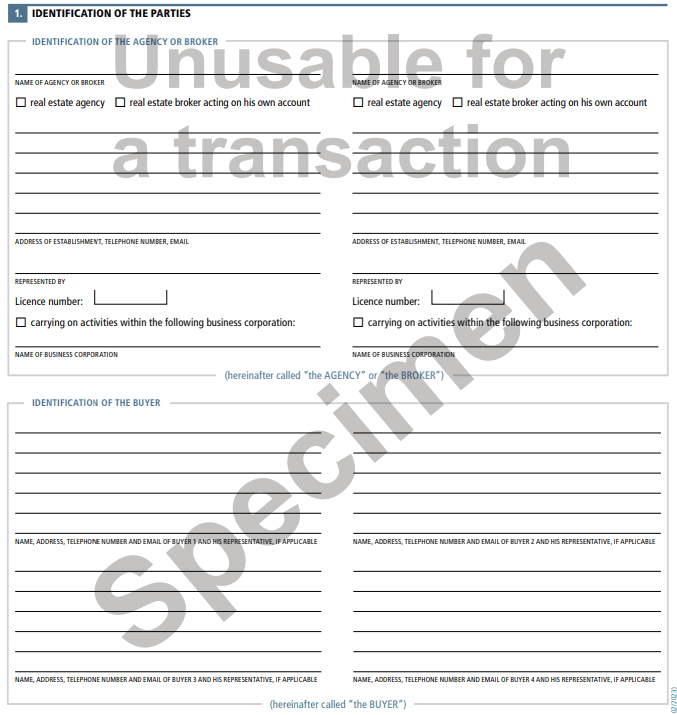
2. Object and Term of Contract
This refers to the period during which the exclusive brokerage contract is in effect. It may include the start date and end date of the contract, as well as any conditions for its early termination.
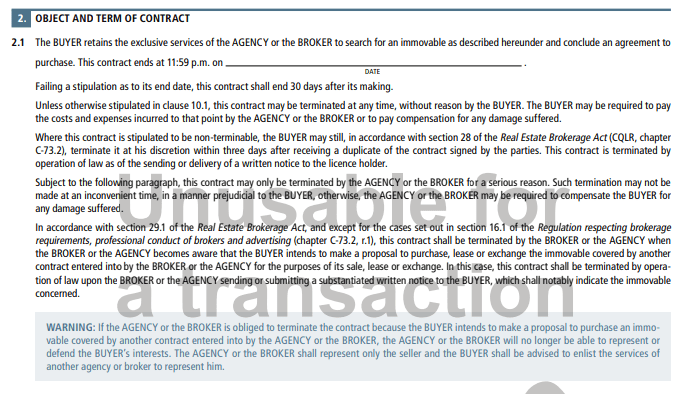
3. Essential Features of the Immovable
This is a detailed description of the real estate sought by the buyer. It may include details such as the type of property (apartment, house, income property, land), geographical location, etc.

4. Additional Features
This concerns additional information related to the property such as the number of bedrooms, desired amenities, etc.

5. Desired Price and Terms of Purchase
In this section, the buyer must indicate the price range they are looking for, the date or timeframe desired for the signing of the deed of sale, as well as the date or timeframe desired for occupancy.

6. Remuneration
The “Remuneration” section pertains to the terms and conditions related to the compensation of the real estate broker for their services. This generally includes the fees and other compensations that the broker will receive in exchange for their work in facilitating the purchase of real estate for the buyer. Typically, it is the seller who pays the broker’s compensation.
For the broker’s fees, it can be a percentage of the purchase price of the real estate, a flat fee, or another agreed-upon formula between the parties.
At the end of this section, it is also mentioned that the agency or the real estate broker will not be entitled to any compensation if:
-They hold an interest.
-A company or legal person under their control holds an interest.
OR
If any of the following persons sell a property to the buyer while holding interests:
-The spouse of the broker or the broker representing the agency with whom they are married or living in a common-law relationship.
-A legal person or company controlled by the spouse of the broker, or the broker representing the agency with whom they are married or living in a common-law relationship.
OR
If the seller does not sign the deed of sale or the payment of the purchase price is not made.
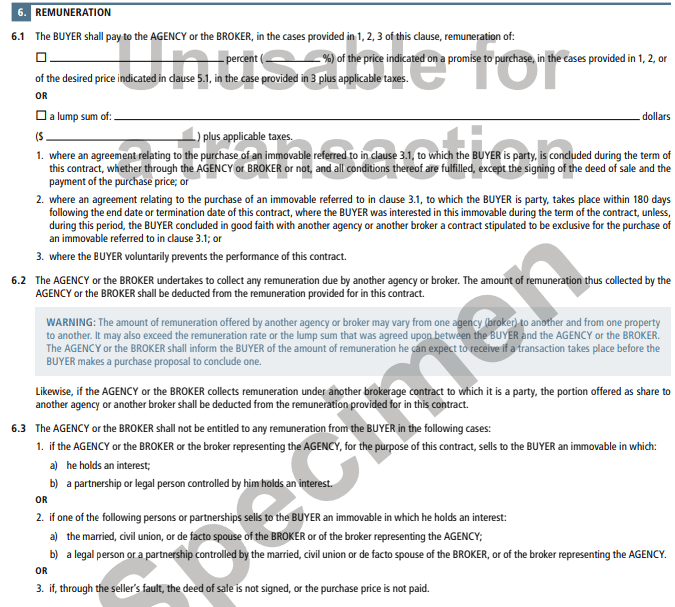
7. Declarations and Obligations of the Buyer
In this section, the buyer acknowledges that the contract is exclusive and commits to negotiating the purchase of real estate through the broker during the specified period in the contract. If the buyer attends an open house for a property, they must inform the seller or the seller’s broker (listing broker) on site that they are represented by a broker.
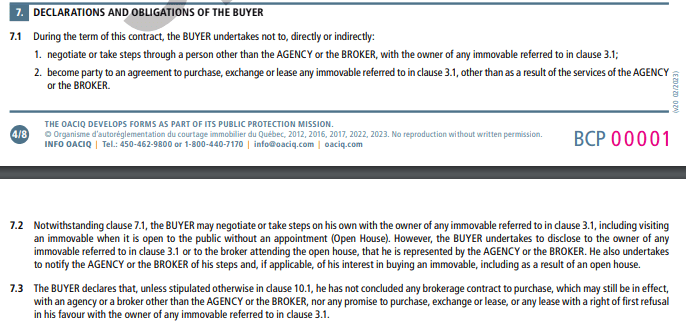
8. Obligations of the Agency or Broker
The contract outlines numerous obligations of the agency or broker. Here is an overview of the main obligations:
-The agency or broker must act in the best interest of the buyer, in accordance with applicable laws and regulations, demonstrating professionalism and ethics.
-The agency or broker must promptly present any written offer regarding the purchase, lease, or exchange of the property to the buyer.
-The agency or broker must disclose in writing to the buyer any compensation agreement related to the contract’s purpose.
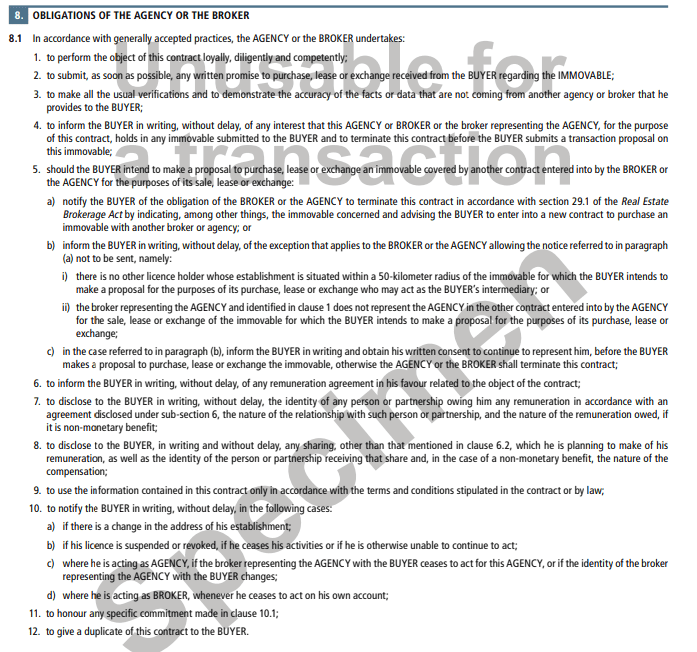
9. Changes Affecting the Agency or the Broker Bound by a Brokerage Contract
Even if the contract is not terminable, it is specified that:
-If the broker ceases their activities to perform them on behalf of an agency, the buyer may terminate the contract. The buyer may also continue to deal with the broker and be bound to the agency. However, notice must be sent to the buyer, stating this change. If notice is not sent no later than the day the broker begins to act on behalf of the agency, the contract will be terminated.
-If the broker ceases their activities voluntarily or due to the suspension or revocation of their license, the contract is terminated from the complete cessation of the broker’s activities or the suspension or revocation of their license.
Even if the contract is not terminable, it is specified that:
-If the broker ceases their activities at one agency to perform them on behalf of another agency, the buyer may terminate the contract. The buyer may also continue to deal with the broker or agency and send notice expressing their choice to the agency. If notice is not sent no later than the day the broker ceases to act on behalf of the agency, the contract will be terminated.
-If the agency ceases its activities, the contract is terminated on the day of the agency’s cessation of activities. However, if the broker associated with that agency decides to operate independently, the buyer may choose to deal with that broker. The buyer is then bound to the broker on the date of termination of this contract on the same terms and conditions provided.
-Similarly, if the agency ceases its activities and the broker from that agency decides to operate within a new agency, the buyer may choose to be bound to that new agency. Written notice must be sent to this agency. The buyer is then bound to the agency on the date of termination of this contract on the same terms and conditions provided.
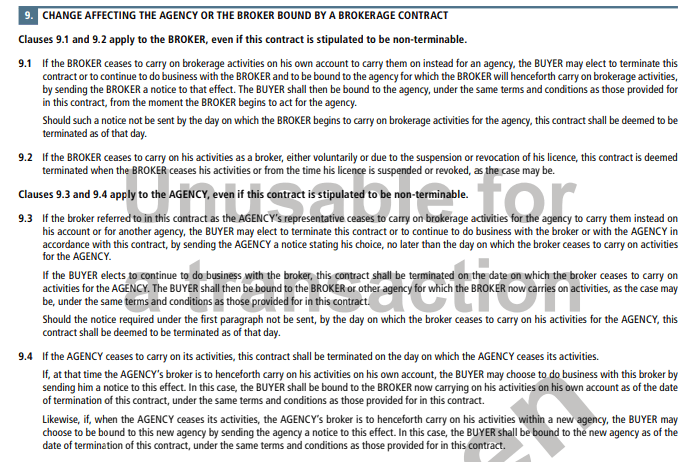
10. Other Declarations and Conditions
Additional statements and conditions can be added in this section.
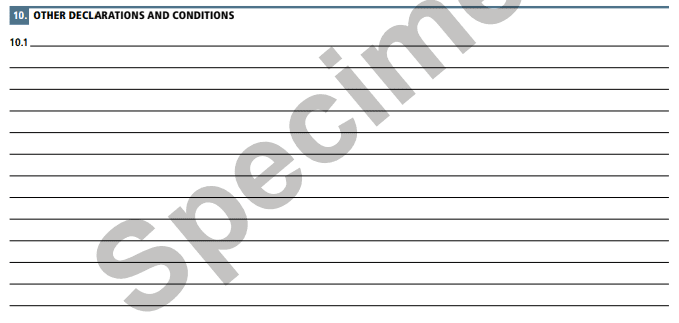
11. Annexes
Annex AG is intended to include specifics in case of insufficient space in the original contract. Less common, Annex DR is used to add supplementary information regarding remuneration and expenses.

12. Interpretation
This section states that the masculine form has been used to lighten the text and that the contract is governed by the laws of Quebec.

13. Conciliation, Mediation, and Arbitration
The OACIQ can act as a mediator or proceed to arbitration between the agency or broker and the buyer in case of dispute.

14. Signatures
This final section stipulates that the information collected in this contract is confidential and necessary for its execution. It is also mentioned that the agency or broker is registered with the Organisme d’autoréglementation du courtage immobilier (OACIQ), ensuring public protection.
Signatures from the agency or broker, as well as from the buyer, are required to finalize the Exclusive Brokerage Contract – Purchase.
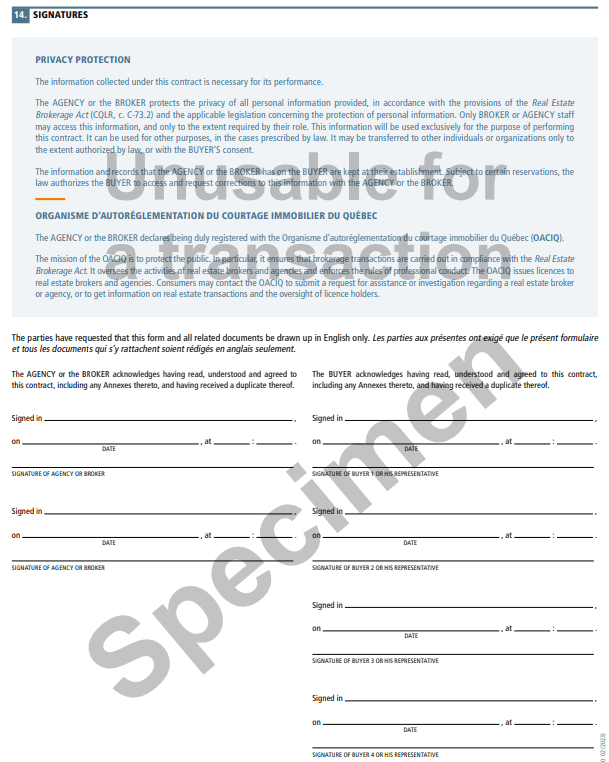
Although the Exclusive Brokerage Contract – Purchase may seem complex at first glance, do not worry – your real estate broker is here to guide you at every step. As a professional in the real estate industry, your broker has the necessary expertise to explain each clause clearly and accessibly. You can rely on them to answer all your questions and dispel any doubts you may have. Their role is not only to assist you in completing the contract correctly but also to ensure that you fully understand the terms and conditions, and that you are comfortable with the mutual commitments. With this professional assistance, the process of purchasing your future property becomes simpler, more transparent, and above all, more efficient.
Read more real estate information

Key interest rate maintained at 2.75%: A favorable environment for the real estate market!
Montreal, April 16, 2025 – The Bank of Canada has decided to maintain its key rate at 2.75%. This stability is explained by economists’ desire

5 financial incentives for your renovation projects
Did you know that subsidies are available for work to improve your home’s ecological footprint? This week, Jean-Vincent, residential and commercial real estate broker with

The key interest rate is cut to 3%: A great opportunity for buyers and sellers!
Montreal, January 29, 2025 – The Bank of Canada today announced a further reduction in its key policy rate to 3%. The 25-basis-point cut is

The Promise to Purchase for an undivided co-ownership
The Promise to Purchase for an undivided co-ownership The Promise to Purchase an undivided property in Quebec differs significantly from that of a divided condominium.

Tranquilli-T: A program offered by RE/MAX real estate brokers
Tranquilli-T – Key Points The Tranquilli-T Program by RE/MAX We understand that buying or selling real estate is a significant step in your life. Our

The conversion of a duplex or triplex (plex) into a cottage (single-family house): a project gaining popularity
Converting a plex into a single-family house – Neighborhoods in Montreal A unique real estate project One of the real estate assets that particularly catches







